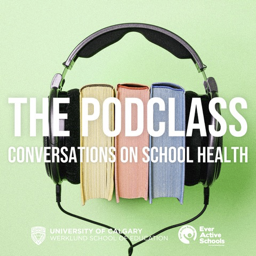Course demographics:
- Who are your typical students? Elementary and secondary B.Ed. students in their last year of their program in a 5-week course just before their final teaching field placement.
- Class size: 150-200+ depending on the section.
- Typical classroom: Lectures for the course were historically held in large theatres
- Course Outline: Attached
The learning experience:
- How would you describe your typical flipped classroom? (What goes on in the classroom, what do you and your students do?)
Instead of lecturing to a large group, we created podcast episodes in a series called The Podclass: Conversations on School Health featuring conversations with different guest experts. Students were assigned one podcast and chose an additional podcast from a group of 2-4 podcasts related to the weekly theme in advance of labs (see attached Podcast Menu for an overview). Case study discussion groups during labs focused on teaching dilemmas that required the application of knowledge from the weekly podcasts. When time allowed, students were also given the opportunity to collaborate with their peers on other assignments in the course.
Your reflections:
- What was your motivation to get started with flipped learning? How did you start?
Historically, EDUC 551 has started with a three day conference during Block Week featuring concurrent sessions and guest speakers. After the Block Week conference, students attended lectures and labs for 5 weeks. While students were enthusiastic during the Block Week conference, they did not seem as engaged during large lectures. We were concerned that a 75 minute lecture, followed by a 3-hour lab was creating cognitive fatigue. We wanted to break up the learning for students, and possibly give them a chance to experience prioritizing their own wellbeing as a main theme in the course is for teachers to consider their own wellbeing. The “secondariness” of auditory podcasts allowed students to exercise, get outside, or develop a hobby while simultaneously learning course content. A Development and Innovation Grant from the Taylor Institute provided the initial funding for the work and resources for this project. When the three-day Block Week conference had to be cancelled due to pandemic restrictions, the plan to flip just the lectures of the course grew to include flipping all of the conference content as well. Ever Active Schools, a national charity focused on supporting healthy school communities, was able to partner with us and through various grants secured the funding to support the expanded initiative.
- What were you excited about? What were you concerned about?
It was exciting and consonant with course objectives to offer course content in an engaging and new format that allowed for students to take a step away from their computers to learn. We were also curious to see how podcasts could serve as a knowledge exchange strategy with the general public and in-service teachers as podcasts can easily be shared. Students have reported that they have shared the podcast with other teachers they know, including their supervising teachers. It has been exciting to see how The Podclass has reached many more than just the students of EDUC 551 as it is available on public podcast platforms (e.g. Apple Podcasts, Spotify, Google Podcasts). It is also featured on VoicEd Radio and the Comprehensive School Health Hub. After two years, nearly 10,000 unique users from all over the world have listened to The Podclass, and there have been over 25,000 downloads.
We were concerned about how students unfamiliar with podcasts would feel about the new format, so we decided to transcribe the podcast episodes so students could have the option to read if that was their preference.
- What was your biggest challenge and how did you address it?
Our biggest challenge was learning how to podcast! This was new terrain, so there was a steep learning curve to learn how to record, edit, and publish podcast episodes. We found excellent partners to help with the technical parts of this project. Stephen Hurley from VoicEd Radio helped with sound production and repeatedly shared his expertise. Ever Active Schools contributed many hours of help with technological tasks to add music and cover art to give The Podclass a polished finish.
- How did you assess students in your course? Was it similar to how you assessed students before you flipped your class?
While the core assignments remained the same, we changed a few of the smaller assignments to reflect the flipped podcast model of the course. To keep students on track in their assigned listening, students were assigned an Annotated Resource List, where they had to summarize the key messages for the podcasts they listened to, as well as contemplate how the ideas could be applied to their upcoming student teaching context.
- What tips do you have for other instructors to engage students in flipped learning?
Many students used the transcripts at some point in the course, sometimes because English was an additional language, or they preferred to read, or sometimes in order to find a quote to use for their assignments, so it is a good thing that we included that alternative. We aimed for the podcasts to have a very conversational tone so that they did not seem like recorded lectures; asking guests to share stories and practical strategies, in addition to applicable research and theory, meant that the podcast conversations were engaging and useful for students preparing for an imminent field placement.
- What was your biggest take-away from the experience?
Students were very engaged by a course delivery model that allowed them to take time to pursue their own wellbeing. They appreciated learning in a way that wasn’t computer-bound, and having a choice in what topics they wanted to learn about for their own professional development as new teachers. They shared their appreciation in multiple emails; below are some quotes from students who gave permission for their comments to be shared:
“This course has been absolutely fantastic and the podclasses were a huge hit! I actually passed them over to my partner teacher a few weeks ago and I hope it can help her out as well. I strongly believe that the podclasses were impactful and represented holistic health with the flexibility it allowed. They were also very high-quality and I know a lot of students truly enjoyed them.”
“I must let you know that I have absolutely loved the course content thus far. I have really enjoyed listening to each of the podcasts and focusing on my personal wellbeing while listening.”
“I thoroughly enjoyed the course. I appreciated that you and others who modified the course for online delivery were attentive to the many hours of screen time we had in other classes. The method of delivery of the content via podcast hit the spot.”
Student Assessment:
- Did you notice any differences in student success?
The GPA for this course was as high or higher for sections in the course this year. Lab instructors who had taught the course previously observed that students seemed more engaged and excited in the flipped podcast model of the course. Especially because all courses had been moved online during the pandemic, a podcast-based course was a welcome change. Instructors also commented that the learning and understanding of students seemed elevated over previous years.
Technology:
Describe any technology used and give examples. If you didn’t use anything just say so as we want to ensure people don’t get hung up on the technology.
We purchased USB microphones for the co-hosts to improve the sound quality of podcast episodes. We used Zencastr to record podcasts and Hindenburg for sound editing. Lastly, we used Otter to help with the transcription of episodes.
Additional Resources
– Elizabeth Tingle & Shelly Russell-Mayhew




